Influence of Culture, Power and Politics on Organizational Behavior
VerifiedAdded on 2023/01/05
|15
|4145
|89
AI Summary
This report analyzes the impact of culture, power, and politics on organizational behavior. It also evaluates motivational techniques for effective goal achievement and discusses the traits of effective and ineffective teams.
Contribute Materials
Your contribution can guide someone’s learning journey. Share your
documents today.
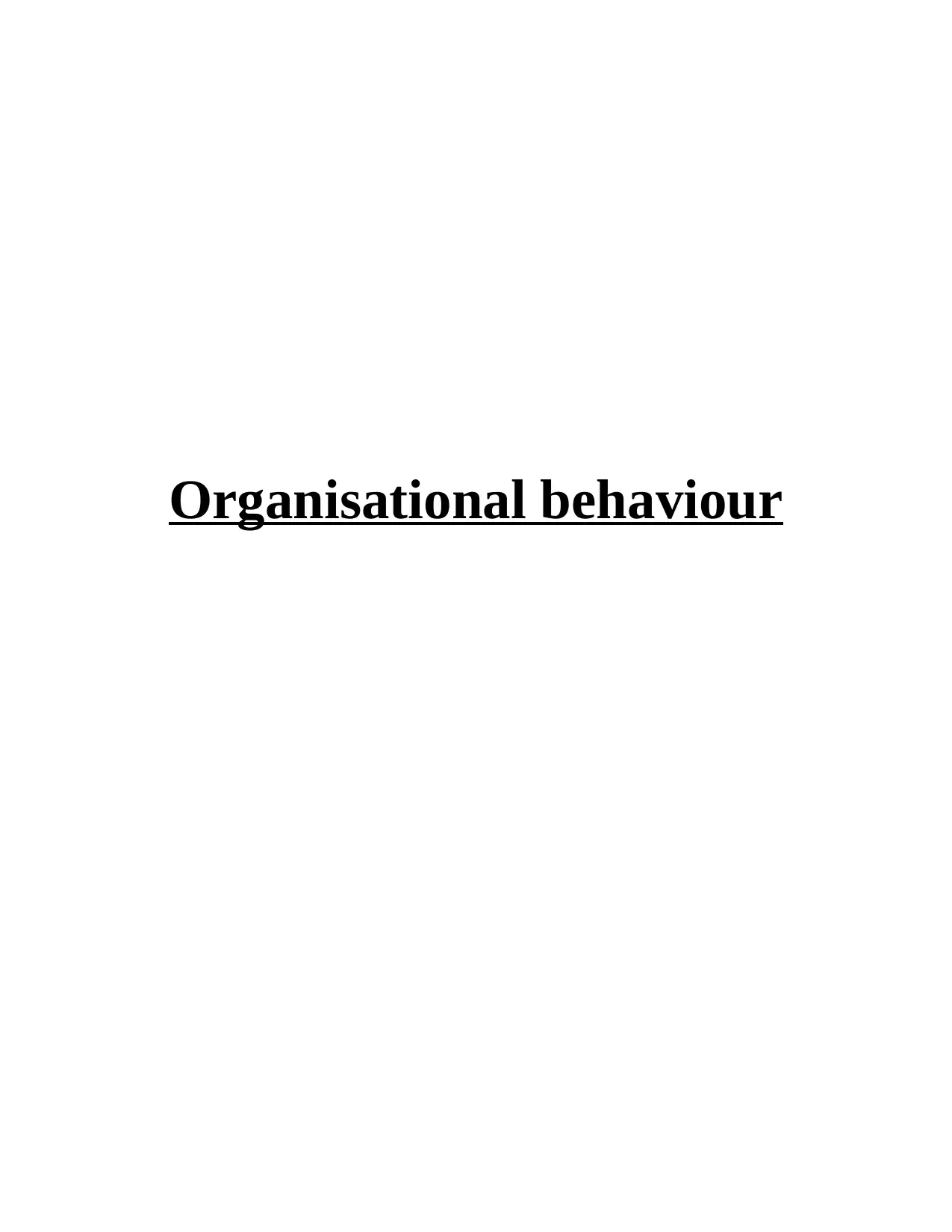
Organisational behaviour
Secure Best Marks with AI Grader
Need help grading? Try our AI Grader for instant feedback on your assignments.
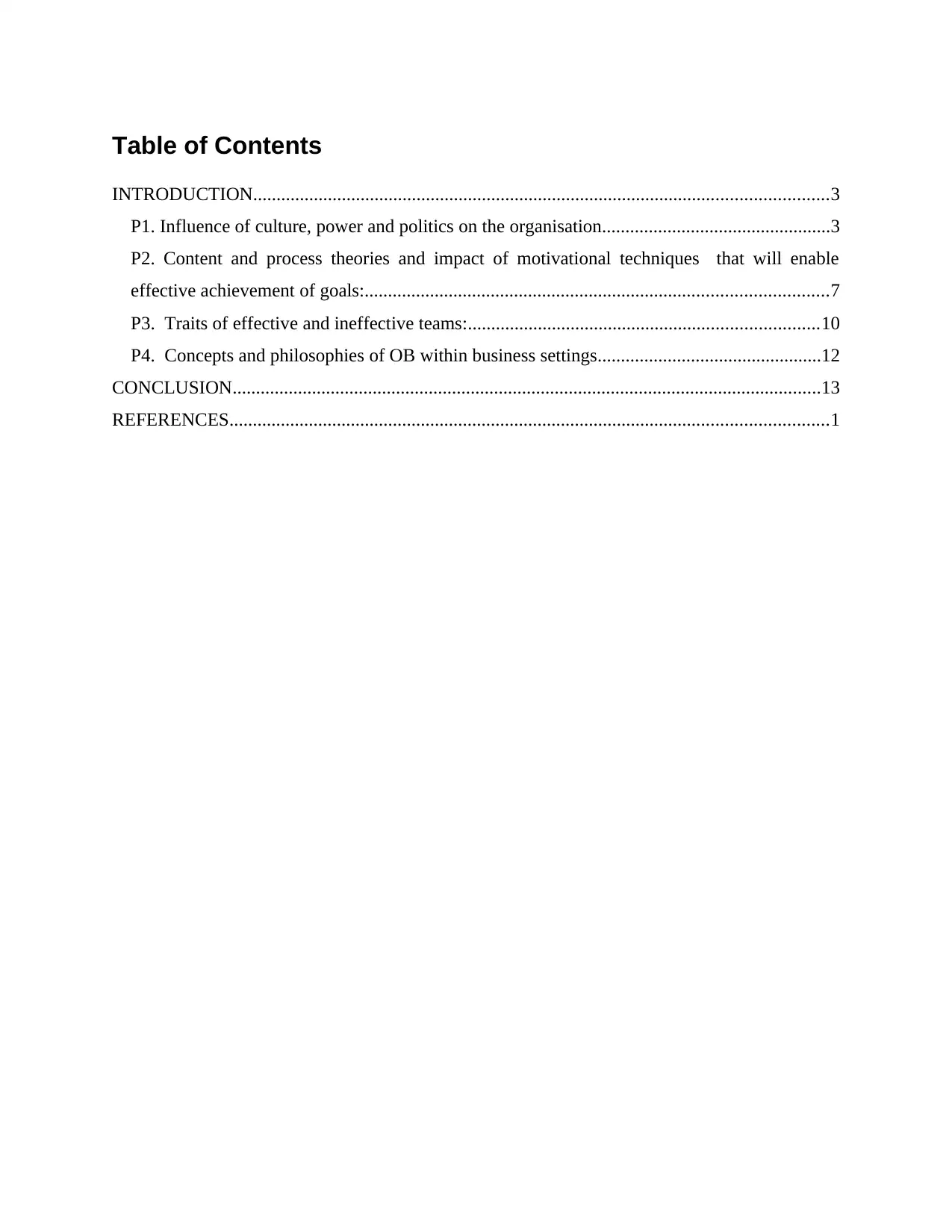
Table of Contents
INTRODUCTION...........................................................................................................................3
P1. Influence of culture, power and politics on the organisation.................................................3
P2. Content and process theories and impact of motivational techniques that will enable
effective achievement of goals:...................................................................................................7
P3. Traits of effective and ineffective teams:...........................................................................10
P4. Concepts and philosophies of OB within business settings................................................12
CONCLUSION..............................................................................................................................13
REFERENCES................................................................................................................................1
INTRODUCTION...........................................................................................................................3
P1. Influence of culture, power and politics on the organisation.................................................3
P2. Content and process theories and impact of motivational techniques that will enable
effective achievement of goals:...................................................................................................7
P3. Traits of effective and ineffective teams:...........................................................................10
P4. Concepts and philosophies of OB within business settings................................................12
CONCLUSION..............................................................................................................................13
REFERENCES................................................................................................................................1
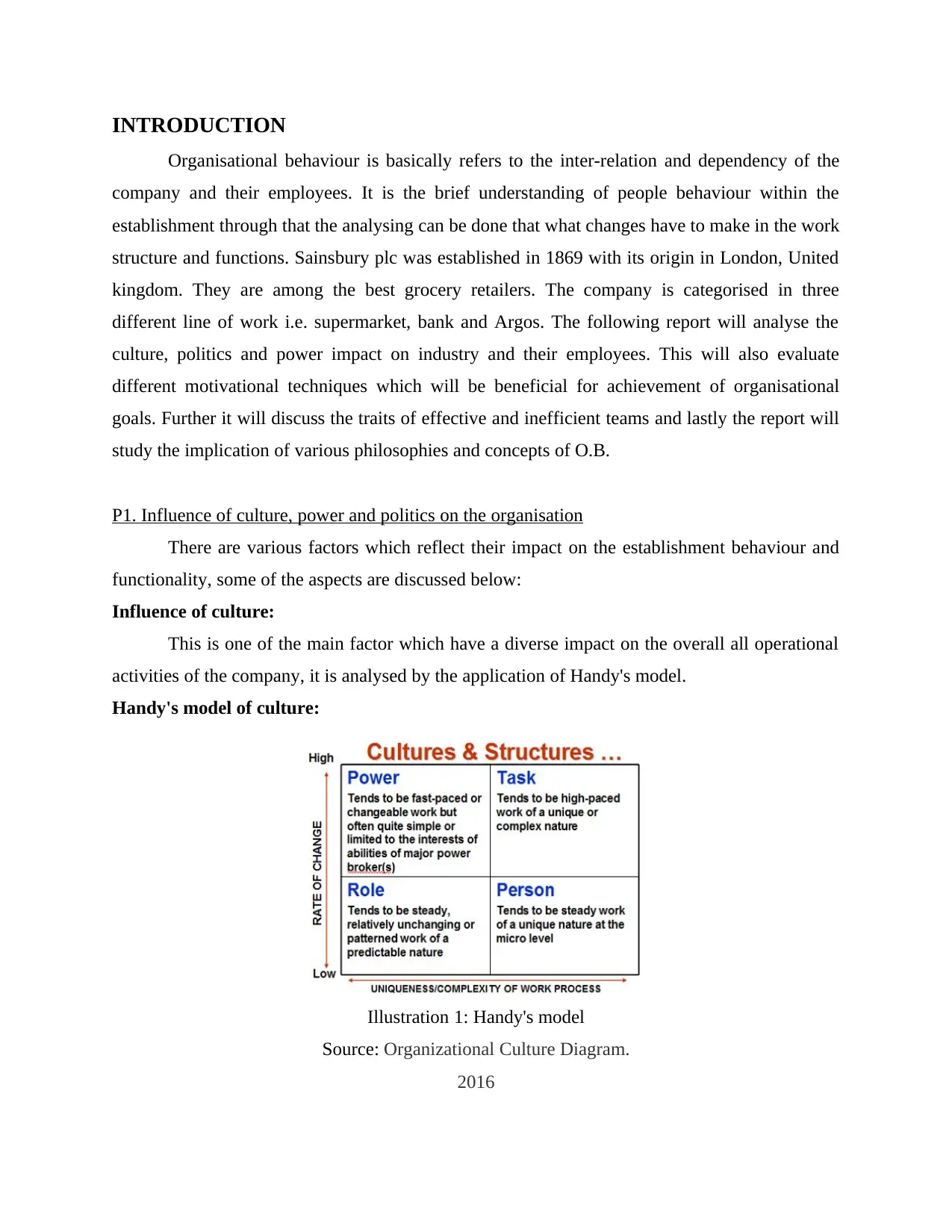
INTRODUCTION
Organisational behaviour is basically refers to the inter-relation and dependency of the
company and their employees. It is the brief understanding of people behaviour within the
establishment through that the analysing can be done that what changes have to make in the work
structure and functions. Sainsbury plc was established in 1869 with its origin in London, United
kingdom. They are among the best grocery retailers. The company is categorised in three
different line of work i.e. supermarket, bank and Argos. The following report will analyse the
culture, politics and power impact on industry and their employees. This will also evaluate
different motivational techniques which will be beneficial for achievement of organisational
goals. Further it will discuss the traits of effective and inefficient teams and lastly the report will
study the implication of various philosophies and concepts of O.B.
P1. Influence of culture, power and politics on the organisation
There are various factors which reflect their impact on the establishment behaviour and
functionality, some of the aspects are discussed below:
Influence of culture:
This is one of the main factor which have a diverse impact on the overall all operational
activities of the company, it is analysed by the application of Handy's model.
Handy's model of culture:
Illustration 1: Handy's model
Source: Organizational Culture Diagram.
2016
Organisational behaviour is basically refers to the inter-relation and dependency of the
company and their employees. It is the brief understanding of people behaviour within the
establishment through that the analysing can be done that what changes have to make in the work
structure and functions. Sainsbury plc was established in 1869 with its origin in London, United
kingdom. They are among the best grocery retailers. The company is categorised in three
different line of work i.e. supermarket, bank and Argos. The following report will analyse the
culture, politics and power impact on industry and their employees. This will also evaluate
different motivational techniques which will be beneficial for achievement of organisational
goals. Further it will discuss the traits of effective and inefficient teams and lastly the report will
study the implication of various philosophies and concepts of O.B.
P1. Influence of culture, power and politics on the organisation
There are various factors which reflect their impact on the establishment behaviour and
functionality, some of the aspects are discussed below:
Influence of culture:
This is one of the main factor which have a diverse impact on the overall all operational
activities of the company, it is analysed by the application of Handy's model.
Handy's model of culture:
Illustration 1: Handy's model
Source: Organizational Culture Diagram.
2016
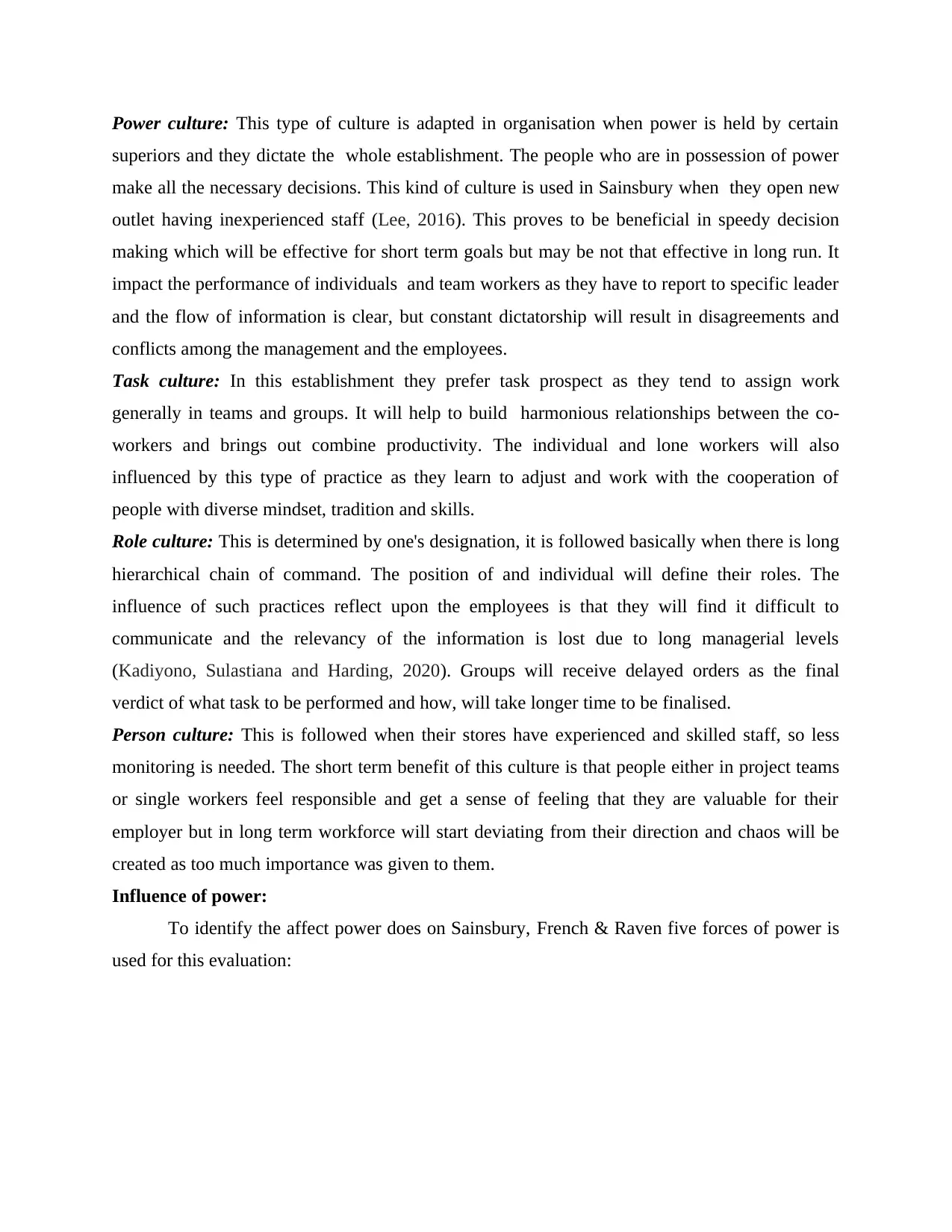
Power culture: This type of culture is adapted in organisation when power is held by certain
superiors and they dictate the whole establishment. The people who are in possession of power
make all the necessary decisions. This kind of culture is used in Sainsbury when they open new
outlet having inexperienced staff (Lee, 2016). This proves to be beneficial in speedy decision
making which will be effective for short term goals but may be not that effective in long run. It
impact the performance of individuals and team workers as they have to report to specific leader
and the flow of information is clear, but constant dictatorship will result in disagreements and
conflicts among the management and the employees.
Task culture: In this establishment they prefer task prospect as they tend to assign work
generally in teams and groups. It will help to build harmonious relationships between the co-
workers and brings out combine productivity. The individual and lone workers will also
influenced by this type of practice as they learn to adjust and work with the cooperation of
people with diverse mindset, tradition and skills.
Role culture: This is determined by one's designation, it is followed basically when there is long
hierarchical chain of command. The position of and individual will define their roles. The
influence of such practices reflect upon the employees is that they will find it difficult to
communicate and the relevancy of the information is lost due to long managerial levels
(Kadiyono, Sulastiana and Harding, 2020). Groups will receive delayed orders as the final
verdict of what task to be performed and how, will take longer time to be finalised.
Person culture: This is followed when their stores have experienced and skilled staff, so less
monitoring is needed. The short term benefit of this culture is that people either in project teams
or single workers feel responsible and get a sense of feeling that they are valuable for their
employer but in long term workforce will start deviating from their direction and chaos will be
created as too much importance was given to them.
Influence of power:
To identify the affect power does on Sainsbury, French & Raven five forces of power is
used for this evaluation:
superiors and they dictate the whole establishment. The people who are in possession of power
make all the necessary decisions. This kind of culture is used in Sainsbury when they open new
outlet having inexperienced staff (Lee, 2016). This proves to be beneficial in speedy decision
making which will be effective for short term goals but may be not that effective in long run. It
impact the performance of individuals and team workers as they have to report to specific leader
and the flow of information is clear, but constant dictatorship will result in disagreements and
conflicts among the management and the employees.
Task culture: In this establishment they prefer task prospect as they tend to assign work
generally in teams and groups. It will help to build harmonious relationships between the co-
workers and brings out combine productivity. The individual and lone workers will also
influenced by this type of practice as they learn to adjust and work with the cooperation of
people with diverse mindset, tradition and skills.
Role culture: This is determined by one's designation, it is followed basically when there is long
hierarchical chain of command. The position of and individual will define their roles. The
influence of such practices reflect upon the employees is that they will find it difficult to
communicate and the relevancy of the information is lost due to long managerial levels
(Kadiyono, Sulastiana and Harding, 2020). Groups will receive delayed orders as the final
verdict of what task to be performed and how, will take longer time to be finalised.
Person culture: This is followed when their stores have experienced and skilled staff, so less
monitoring is needed. The short term benefit of this culture is that people either in project teams
or single workers feel responsible and get a sense of feeling that they are valuable for their
employer but in long term workforce will start deviating from their direction and chaos will be
created as too much importance was given to them.
Influence of power:
To identify the affect power does on Sainsbury, French & Raven five forces of power is
used for this evaluation:
Secure Best Marks with AI Grader
Need help grading? Try our AI Grader for instant feedback on your assignments.
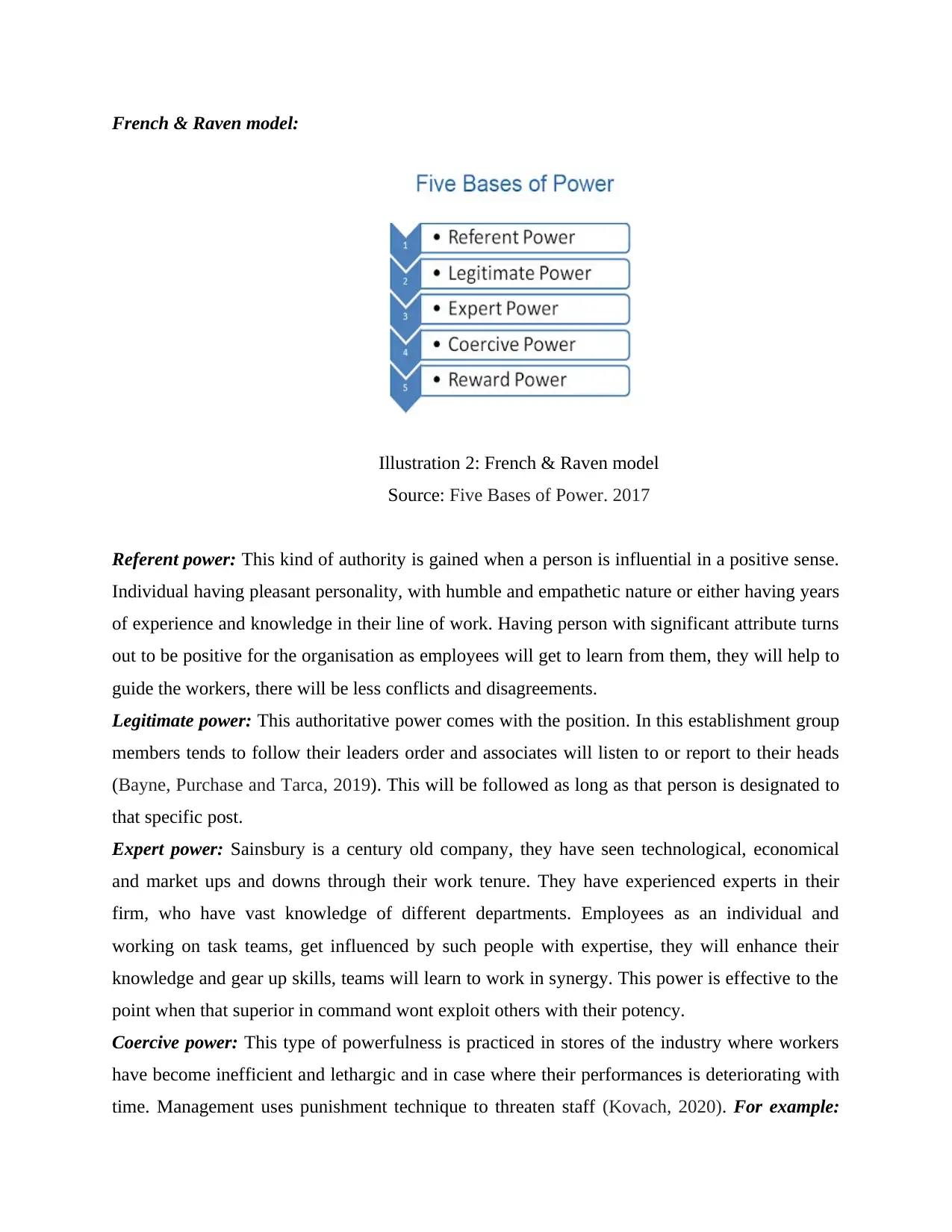
French & Raven model:
Referent power: This kind of authority is gained when a person is influential in a positive sense.
Individual having pleasant personality, with humble and empathetic nature or either having years
of experience and knowledge in their line of work. Having person with significant attribute turns
out to be positive for the organisation as employees will get to learn from them, they will help to
guide the workers, there will be less conflicts and disagreements.
Legitimate power: This authoritative power comes with the position. In this establishment group
members tends to follow their leaders order and associates will listen to or report to their heads
(Bayne, Purchase and Tarca, 2019). This will be followed as long as that person is designated to
that specific post.
Expert power: Sainsbury is a century old company, they have seen technological, economical
and market ups and downs through their work tenure. They have experienced experts in their
firm, who have vast knowledge of different departments. Employees as an individual and
working on task teams, get influenced by such people with expertise, they will enhance their
knowledge and gear up skills, teams will learn to work in synergy. This power is effective to the
point when that superior in command wont exploit others with their potency.
Coercive power: This type of powerfulness is practiced in stores of the industry where workers
have become inefficient and lethargic and in case where their performances is deteriorating with
time. Management uses punishment technique to threaten staff (Kovach, 2020). For example:
Illustration 2: French & Raven model
Source: Five Bases of Power. 2017
Referent power: This kind of authority is gained when a person is influential in a positive sense.
Individual having pleasant personality, with humble and empathetic nature or either having years
of experience and knowledge in their line of work. Having person with significant attribute turns
out to be positive for the organisation as employees will get to learn from them, they will help to
guide the workers, there will be less conflicts and disagreements.
Legitimate power: This authoritative power comes with the position. In this establishment group
members tends to follow their leaders order and associates will listen to or report to their heads
(Bayne, Purchase and Tarca, 2019). This will be followed as long as that person is designated to
that specific post.
Expert power: Sainsbury is a century old company, they have seen technological, economical
and market ups and downs through their work tenure. They have experienced experts in their
firm, who have vast knowledge of different departments. Employees as an individual and
working on task teams, get influenced by such people with expertise, they will enhance their
knowledge and gear up skills, teams will learn to work in synergy. This power is effective to the
point when that superior in command wont exploit others with their potency.
Coercive power: This type of powerfulness is practiced in stores of the industry where workers
have become inefficient and lethargic and in case where their performances is deteriorating with
time. Management uses punishment technique to threaten staff (Kovach, 2020). For example:
Illustration 2: French & Raven model
Source: Five Bases of Power. 2017
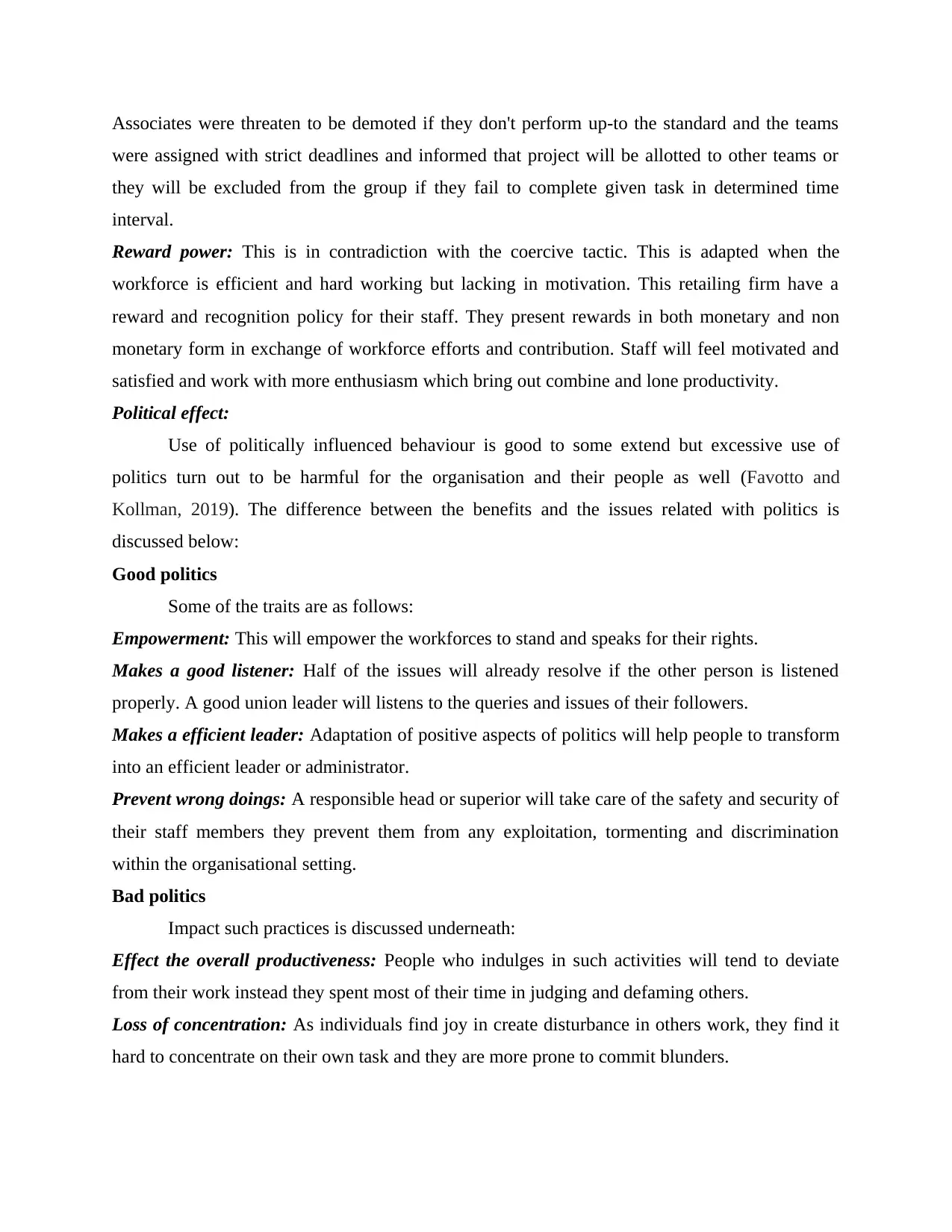
Associates were threaten to be demoted if they don't perform up-to the standard and the teams
were assigned with strict deadlines and informed that project will be allotted to other teams or
they will be excluded from the group if they fail to complete given task in determined time
interval.
Reward power: This is in contradiction with the coercive tactic. This is adapted when the
workforce is efficient and hard working but lacking in motivation. This retailing firm have a
reward and recognition policy for their staff. They present rewards in both monetary and non
monetary form in exchange of workforce efforts and contribution. Staff will feel motivated and
satisfied and work with more enthusiasm which bring out combine and lone productivity.
Political effect:
Use of politically influenced behaviour is good to some extend but excessive use of
politics turn out to be harmful for the organisation and their people as well (Favotto and
Kollman, 2019). The difference between the benefits and the issues related with politics is
discussed below:
Good politics
Some of the traits are as follows:
Empowerment: This will empower the workforces to stand and speaks for their rights.
Makes a good listener: Half of the issues will already resolve if the other person is listened
properly. A good union leader will listens to the queries and issues of their followers.
Makes a efficient leader: Adaptation of positive aspects of politics will help people to transform
into an efficient leader or administrator.
Prevent wrong doings: A responsible head or superior will take care of the safety and security of
their staff members they prevent them from any exploitation, tormenting and discrimination
within the organisational setting.
Bad politics
Impact such practices is discussed underneath:
Effect the overall productiveness: People who indulges in such activities will tend to deviate
from their work instead they spent most of their time in judging and defaming others.
Loss of concentration: As individuals find joy in create disturbance in others work, they find it
hard to concentrate on their own task and they are more prone to commit blunders.
were assigned with strict deadlines and informed that project will be allotted to other teams or
they will be excluded from the group if they fail to complete given task in determined time
interval.
Reward power: This is in contradiction with the coercive tactic. This is adapted when the
workforce is efficient and hard working but lacking in motivation. This retailing firm have a
reward and recognition policy for their staff. They present rewards in both monetary and non
monetary form in exchange of workforce efforts and contribution. Staff will feel motivated and
satisfied and work with more enthusiasm which bring out combine and lone productivity.
Political effect:
Use of politically influenced behaviour is good to some extend but excessive use of
politics turn out to be harmful for the organisation and their people as well (Favotto and
Kollman, 2019). The difference between the benefits and the issues related with politics is
discussed below:
Good politics
Some of the traits are as follows:
Empowerment: This will empower the workforces to stand and speaks for their rights.
Makes a good listener: Half of the issues will already resolve if the other person is listened
properly. A good union leader will listens to the queries and issues of their followers.
Makes a efficient leader: Adaptation of positive aspects of politics will help people to transform
into an efficient leader or administrator.
Prevent wrong doings: A responsible head or superior will take care of the safety and security of
their staff members they prevent them from any exploitation, tormenting and discrimination
within the organisational setting.
Bad politics
Impact such practices is discussed underneath:
Effect the overall productiveness: People who indulges in such activities will tend to deviate
from their work instead they spent most of their time in judging and defaming others.
Loss of concentration: As individuals find joy in create disturbance in others work, they find it
hard to concentrate on their own task and they are more prone to commit blunders.
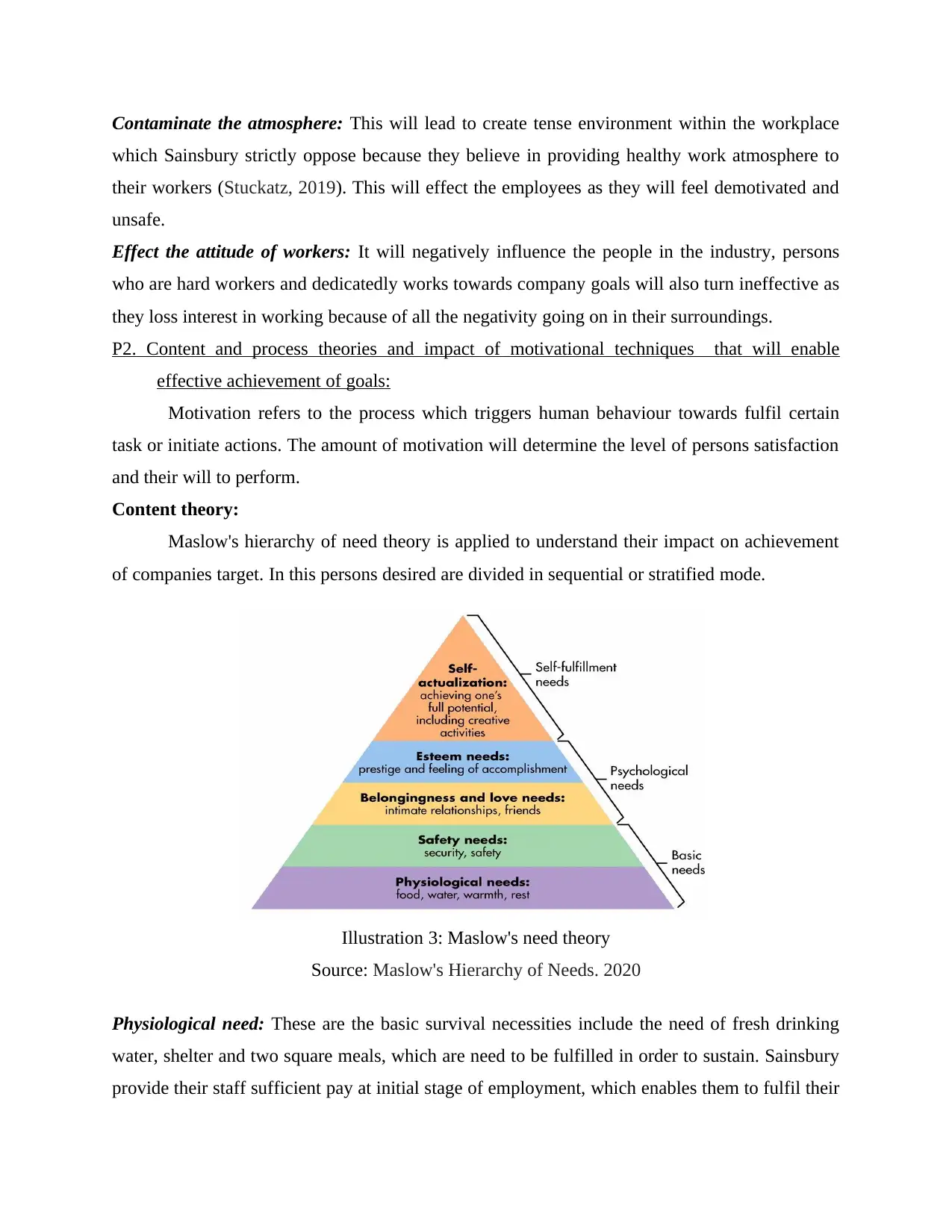
Contaminate the atmosphere: This will lead to create tense environment within the workplace
which Sainsbury strictly oppose because they believe in providing healthy work atmosphere to
their workers (Stuckatz, 2019). This will effect the employees as they will feel demotivated and
unsafe.
Effect the attitude of workers: It will negatively influence the people in the industry, persons
who are hard workers and dedicatedly works towards company goals will also turn ineffective as
they loss interest in working because of all the negativity going on in their surroundings.
P2. Content and process theories and impact of motivational techniques that will enable
effective achievement of goals:
Motivation refers to the process which triggers human behaviour towards fulfil certain
task or initiate actions. The amount of motivation will determine the level of persons satisfaction
and their will to perform.
Content theory:
Maslow's hierarchy of need theory is applied to understand their impact on achievement
of companies target. In this persons desired are divided in sequential or stratified mode.
Physiological need: These are the basic survival necessities include the need of fresh drinking
water, shelter and two square meals, which are need to be fulfilled in order to sustain. Sainsbury
provide their staff sufficient pay at initial stage of employment, which enables them to fulfil their
Illustration 3: Maslow's need theory
Source: Maslow's Hierarchy of Needs. 2020
which Sainsbury strictly oppose because they believe in providing healthy work atmosphere to
their workers (Stuckatz, 2019). This will effect the employees as they will feel demotivated and
unsafe.
Effect the attitude of workers: It will negatively influence the people in the industry, persons
who are hard workers and dedicatedly works towards company goals will also turn ineffective as
they loss interest in working because of all the negativity going on in their surroundings.
P2. Content and process theories and impact of motivational techniques that will enable
effective achievement of goals:
Motivation refers to the process which triggers human behaviour towards fulfil certain
task or initiate actions. The amount of motivation will determine the level of persons satisfaction
and their will to perform.
Content theory:
Maslow's hierarchy of need theory is applied to understand their impact on achievement
of companies target. In this persons desired are divided in sequential or stratified mode.
Physiological need: These are the basic survival necessities include the need of fresh drinking
water, shelter and two square meals, which are need to be fulfilled in order to sustain. Sainsbury
provide their staff sufficient pay at initial stage of employment, which enables them to fulfil their
Illustration 3: Maslow's need theory
Source: Maslow's Hierarchy of Needs. 2020
Paraphrase This Document
Need a fresh take? Get an instant paraphrase of this document with our AI Paraphraser
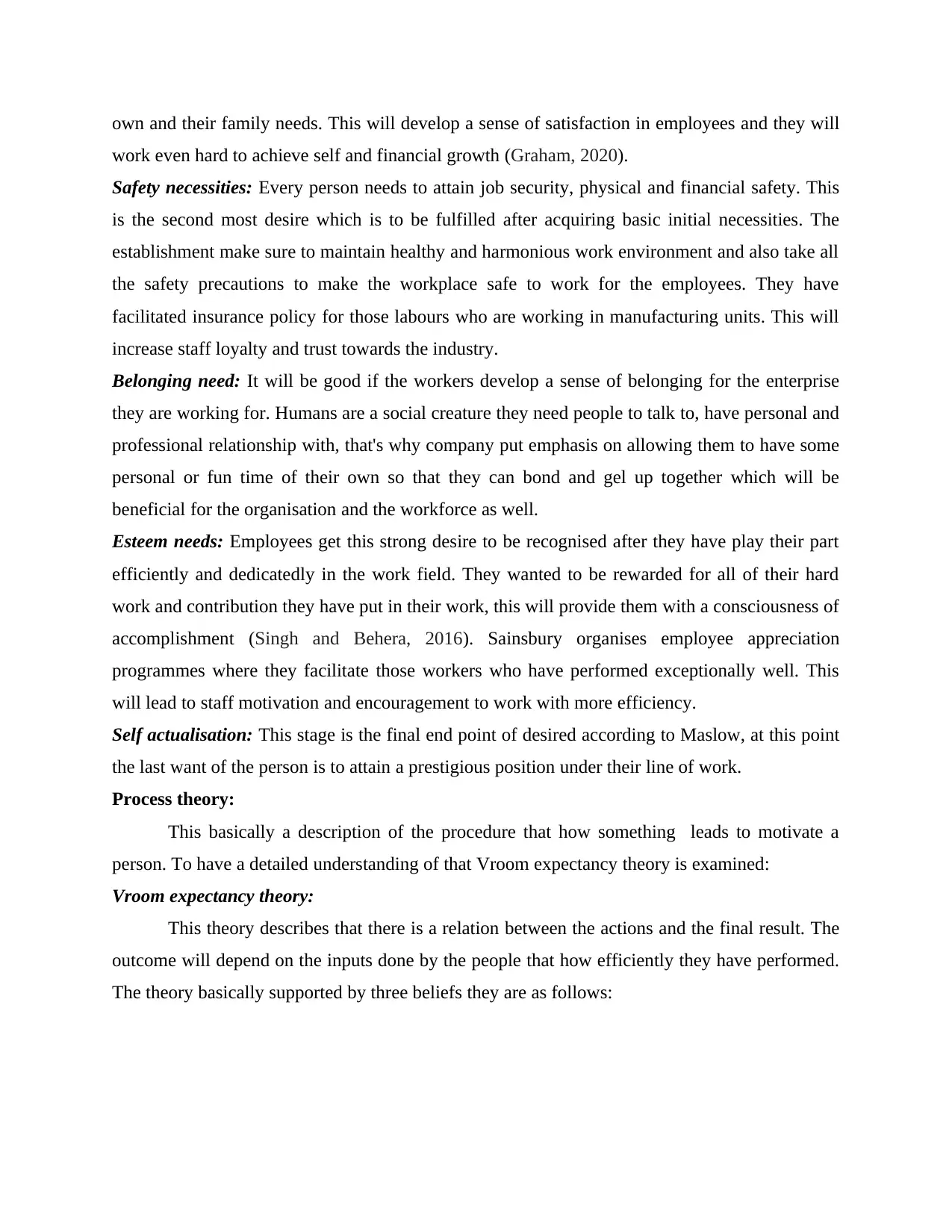
own and their family needs. This will develop a sense of satisfaction in employees and they will
work even hard to achieve self and financial growth (Graham, 2020).
Safety necessities: Every person needs to attain job security, physical and financial safety. This
is the second most desire which is to be fulfilled after acquiring basic initial necessities. The
establishment make sure to maintain healthy and harmonious work environment and also take all
the safety precautions to make the workplace safe to work for the employees. They have
facilitated insurance policy for those labours who are working in manufacturing units. This will
increase staff loyalty and trust towards the industry.
Belonging need: It will be good if the workers develop a sense of belonging for the enterprise
they are working for. Humans are a social creature they need people to talk to, have personal and
professional relationship with, that's why company put emphasis on allowing them to have some
personal or fun time of their own so that they can bond and gel up together which will be
beneficial for the organisation and the workforce as well.
Esteem needs: Employees get this strong desire to be recognised after they have play their part
efficiently and dedicatedly in the work field. They wanted to be rewarded for all of their hard
work and contribution they have put in their work, this will provide them with a consciousness of
accomplishment (Singh and Behera, 2016). Sainsbury organises employee appreciation
programmes where they facilitate those workers who have performed exceptionally well. This
will lead to staff motivation and encouragement to work with more efficiency.
Self actualisation: This stage is the final end point of desired according to Maslow, at this point
the last want of the person is to attain a prestigious position under their line of work.
Process theory:
This basically a description of the procedure that how something leads to motivate a
person. To have a detailed understanding of that Vroom expectancy theory is examined:
Vroom expectancy theory:
This theory describes that there is a relation between the actions and the final result. The
outcome will depend on the inputs done by the people that how efficiently they have performed.
The theory basically supported by three beliefs they are as follows:
work even hard to achieve self and financial growth (Graham, 2020).
Safety necessities: Every person needs to attain job security, physical and financial safety. This
is the second most desire which is to be fulfilled after acquiring basic initial necessities. The
establishment make sure to maintain healthy and harmonious work environment and also take all
the safety precautions to make the workplace safe to work for the employees. They have
facilitated insurance policy for those labours who are working in manufacturing units. This will
increase staff loyalty and trust towards the industry.
Belonging need: It will be good if the workers develop a sense of belonging for the enterprise
they are working for. Humans are a social creature they need people to talk to, have personal and
professional relationship with, that's why company put emphasis on allowing them to have some
personal or fun time of their own so that they can bond and gel up together which will be
beneficial for the organisation and the workforce as well.
Esteem needs: Employees get this strong desire to be recognised after they have play their part
efficiently and dedicatedly in the work field. They wanted to be rewarded for all of their hard
work and contribution they have put in their work, this will provide them with a consciousness of
accomplishment (Singh and Behera, 2016). Sainsbury organises employee appreciation
programmes where they facilitate those workers who have performed exceptionally well. This
will lead to staff motivation and encouragement to work with more efficiency.
Self actualisation: This stage is the final end point of desired according to Maslow, at this point
the last want of the person is to attain a prestigious position under their line of work.
Process theory:
This basically a description of the procedure that how something leads to motivate a
person. To have a detailed understanding of that Vroom expectancy theory is examined:
Vroom expectancy theory:
This theory describes that there is a relation between the actions and the final result. The
outcome will depend on the inputs done by the people that how efficiently they have performed.
The theory basically supported by three beliefs they are as follows:
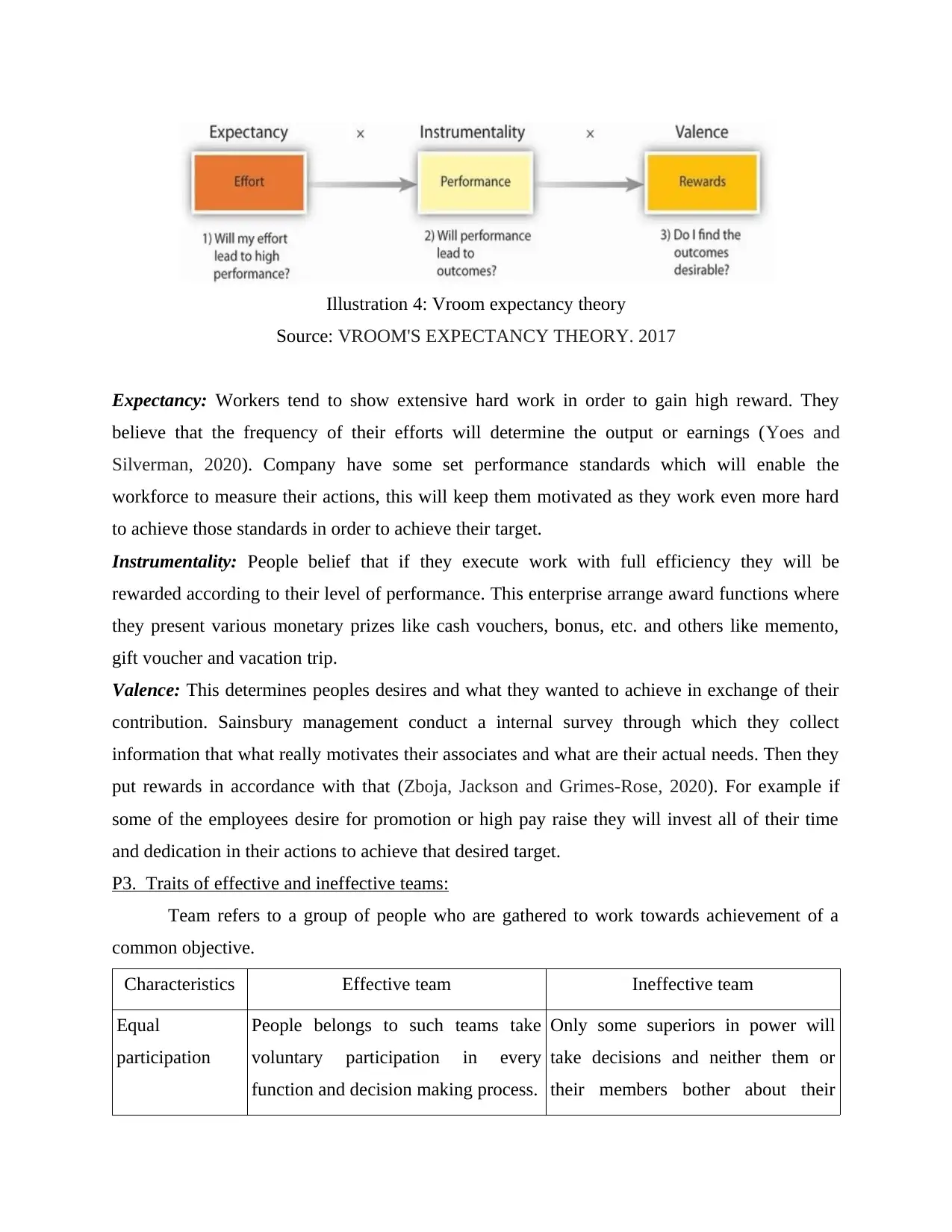
Expectancy: Workers tend to show extensive hard work in order to gain high reward. They
believe that the frequency of their efforts will determine the output or earnings (Yoes and
Silverman, 2020). Company have some set performance standards which will enable the
workforce to measure their actions, this will keep them motivated as they work even more hard
to achieve those standards in order to achieve their target.
Instrumentality: People belief that if they execute work with full efficiency they will be
rewarded according to their level of performance. This enterprise arrange award functions where
they present various monetary prizes like cash vouchers, bonus, etc. and others like memento,
gift voucher and vacation trip.
Valence: This determines peoples desires and what they wanted to achieve in exchange of their
contribution. Sainsbury management conduct a internal survey through which they collect
information that what really motivates their associates and what are their actual needs. Then they
put rewards in accordance with that (Zboja, Jackson and Grimes-Rose, 2020). For example if
some of the employees desire for promotion or high pay raise they will invest all of their time
and dedication in their actions to achieve that desired target.
P3. Traits of effective and ineffective teams:
Team refers to a group of people who are gathered to work towards achievement of a
common objective.
Characteristics Effective team Ineffective team
Equal
participation
People belongs to such teams take
voluntary participation in every
function and decision making process.
Only some superiors in power will
take decisions and neither them or
their members bother about their
Illustration 4: Vroom expectancy theory
Source: VROOM'S EXPECTANCY THEORY. 2017
believe that the frequency of their efforts will determine the output or earnings (Yoes and
Silverman, 2020). Company have some set performance standards which will enable the
workforce to measure their actions, this will keep them motivated as they work even more hard
to achieve those standards in order to achieve their target.
Instrumentality: People belief that if they execute work with full efficiency they will be
rewarded according to their level of performance. This enterprise arrange award functions where
they present various monetary prizes like cash vouchers, bonus, etc. and others like memento,
gift voucher and vacation trip.
Valence: This determines peoples desires and what they wanted to achieve in exchange of their
contribution. Sainsbury management conduct a internal survey through which they collect
information that what really motivates their associates and what are their actual needs. Then they
put rewards in accordance with that (Zboja, Jackson and Grimes-Rose, 2020). For example if
some of the employees desire for promotion or high pay raise they will invest all of their time
and dedication in their actions to achieve that desired target.
P3. Traits of effective and ineffective teams:
Team refers to a group of people who are gathered to work towards achievement of a
common objective.
Characteristics Effective team Ineffective team
Equal
participation
People belongs to such teams take
voluntary participation in every
function and decision making process.
Only some superiors in power will
take decisions and neither them or
their members bother about their
Illustration 4: Vroom expectancy theory
Source: VROOM'S EXPECTANCY THEORY. 2017
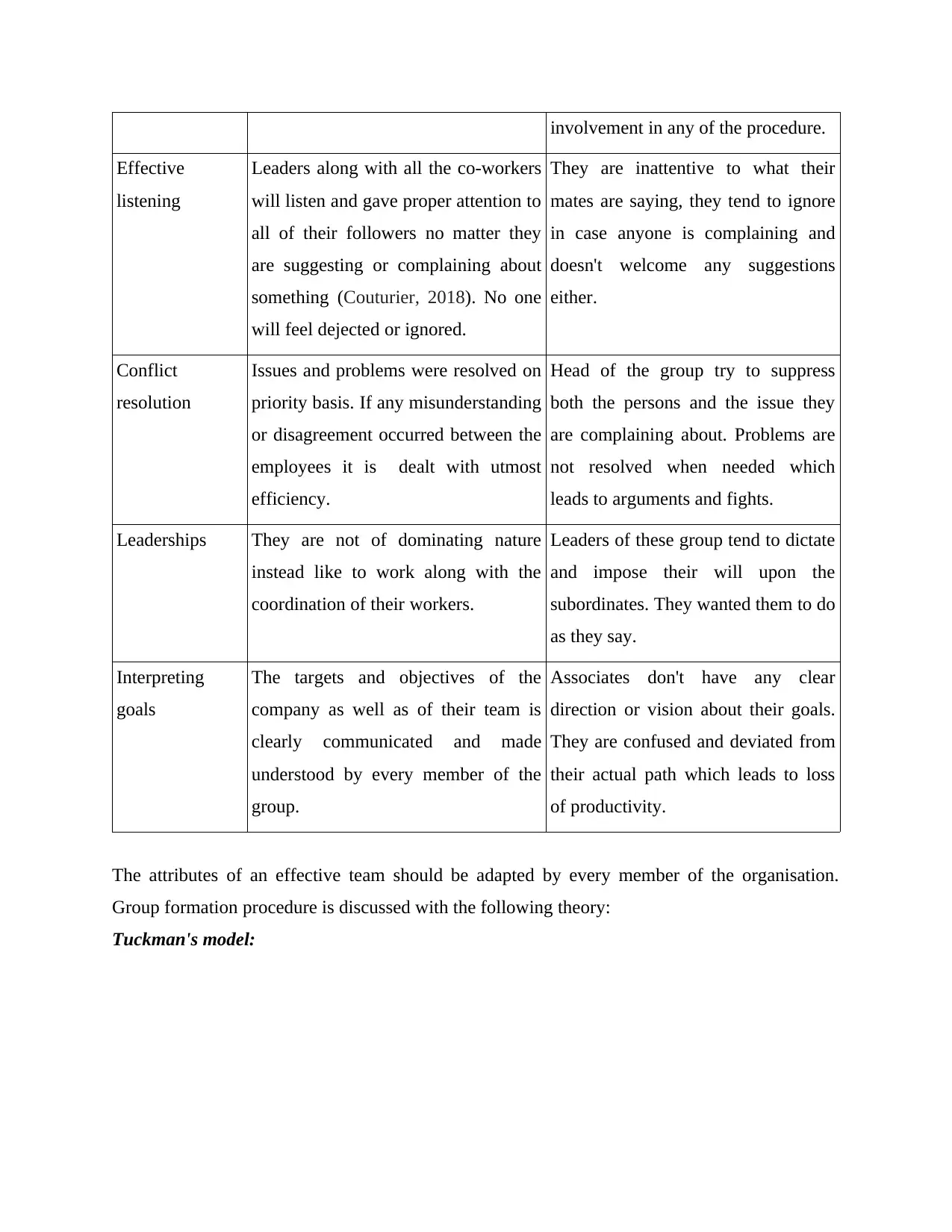
involvement in any of the procedure.
Effective
listening
Leaders along with all the co-workers
will listen and gave proper attention to
all of their followers no matter they
are suggesting or complaining about
something (Couturier, 2018). No one
will feel dejected or ignored.
They are inattentive to what their
mates are saying, they tend to ignore
in case anyone is complaining and
doesn't welcome any suggestions
either.
Conflict
resolution
Issues and problems were resolved on
priority basis. If any misunderstanding
or disagreement occurred between the
employees it is dealt with utmost
efficiency.
Head of the group try to suppress
both the persons and the issue they
are complaining about. Problems are
not resolved when needed which
leads to arguments and fights.
Leaderships They are not of dominating nature
instead like to work along with the
coordination of their workers.
Leaders of these group tend to dictate
and impose their will upon the
subordinates. They wanted them to do
as they say.
Interpreting
goals
The targets and objectives of the
company as well as of their team is
clearly communicated and made
understood by every member of the
group.
Associates don't have any clear
direction or vision about their goals.
They are confused and deviated from
their actual path which leads to loss
of productivity.
The attributes of an effective team should be adapted by every member of the organisation.
Group formation procedure is discussed with the following theory:
Tuckman's model:
Effective
listening
Leaders along with all the co-workers
will listen and gave proper attention to
all of their followers no matter they
are suggesting or complaining about
something (Couturier, 2018). No one
will feel dejected or ignored.
They are inattentive to what their
mates are saying, they tend to ignore
in case anyone is complaining and
doesn't welcome any suggestions
either.
Conflict
resolution
Issues and problems were resolved on
priority basis. If any misunderstanding
or disagreement occurred between the
employees it is dealt with utmost
efficiency.
Head of the group try to suppress
both the persons and the issue they
are complaining about. Problems are
not resolved when needed which
leads to arguments and fights.
Leaderships They are not of dominating nature
instead like to work along with the
coordination of their workers.
Leaders of these group tend to dictate
and impose their will upon the
subordinates. They wanted them to do
as they say.
Interpreting
goals
The targets and objectives of the
company as well as of their team is
clearly communicated and made
understood by every member of the
group.
Associates don't have any clear
direction or vision about their goals.
They are confused and deviated from
their actual path which leads to loss
of productivity.
The attributes of an effective team should be adapted by every member of the organisation.
Group formation procedure is discussed with the following theory:
Tuckman's model:
Secure Best Marks with AI Grader
Need help grading? Try our AI Grader for instant feedback on your assignments.
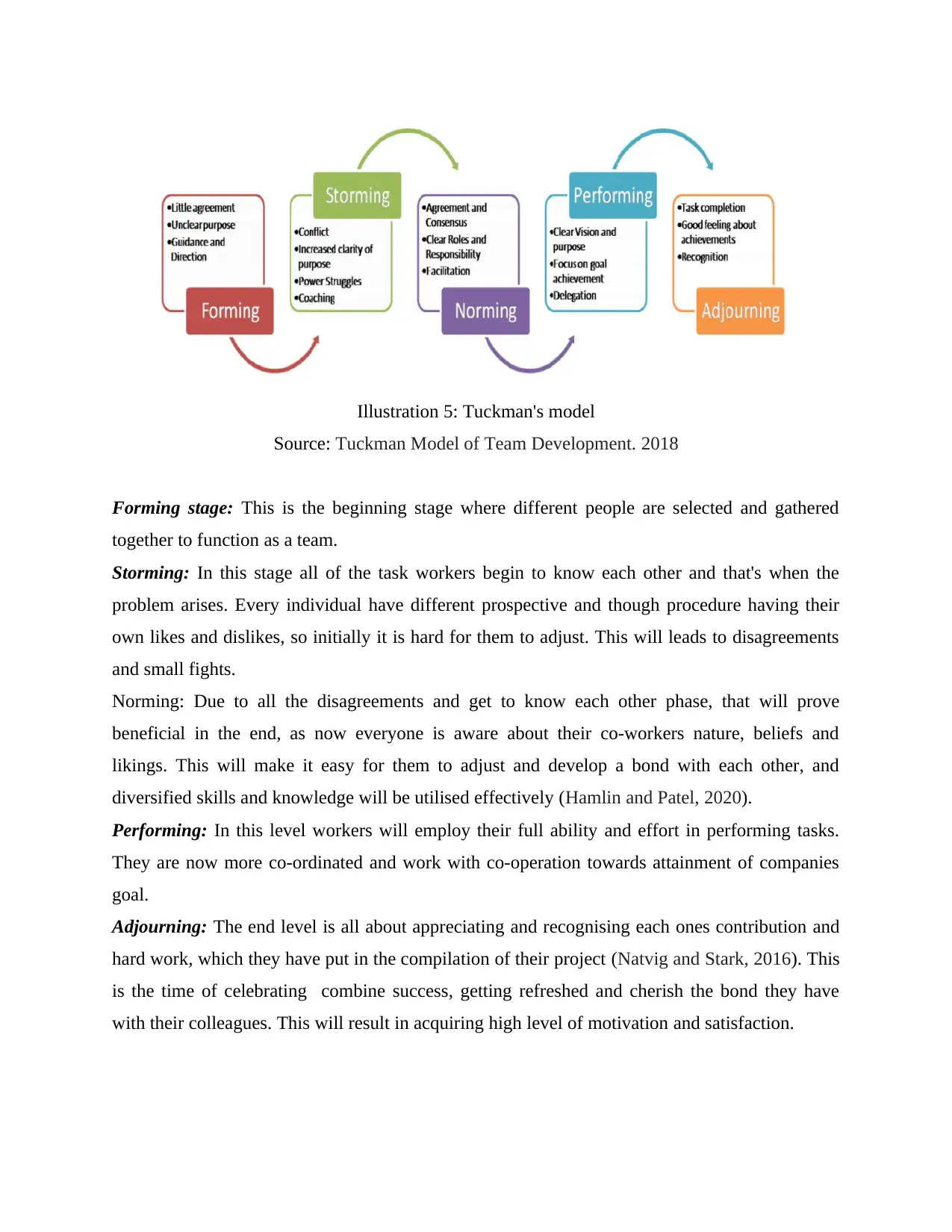
Forming stage: This is the beginning stage where different people are selected and gathered
together to function as a team.
Storming: In this stage all of the task workers begin to know each other and that's when the
problem arises. Every individual have different prospective and though procedure having their
own likes and dislikes, so initially it is hard for them to adjust. This will leads to disagreements
and small fights.
Norming: Due to all the disagreements and get to know each other phase, that will prove
beneficial in the end, as now everyone is aware about their co-workers nature, beliefs and
likings. This will make it easy for them to adjust and develop a bond with each other, and
diversified skills and knowledge will be utilised effectively (Hamlin and Patel, 2020).
Performing: In this level workers will employ their full ability and effort in performing tasks.
They are now more co-ordinated and work with co-operation towards attainment of companies
goal.
Adjourning: The end level is all about appreciating and recognising each ones contribution and
hard work, which they have put in the compilation of their project (Natvig and Stark, 2016). This
is the time of celebrating combine success, getting refreshed and cherish the bond they have
with their colleagues. This will result in acquiring high level of motivation and satisfaction.
Illustration 5: Tuckman's model
Source: Tuckman Model of Team Development. 2018
together to function as a team.
Storming: In this stage all of the task workers begin to know each other and that's when the
problem arises. Every individual have different prospective and though procedure having their
own likes and dislikes, so initially it is hard for them to adjust. This will leads to disagreements
and small fights.
Norming: Due to all the disagreements and get to know each other phase, that will prove
beneficial in the end, as now everyone is aware about their co-workers nature, beliefs and
likings. This will make it easy for them to adjust and develop a bond with each other, and
diversified skills and knowledge will be utilised effectively (Hamlin and Patel, 2020).
Performing: In this level workers will employ their full ability and effort in performing tasks.
They are now more co-ordinated and work with co-operation towards attainment of companies
goal.
Adjourning: The end level is all about appreciating and recognising each ones contribution and
hard work, which they have put in the compilation of their project (Natvig and Stark, 2016). This
is the time of celebrating combine success, getting refreshed and cherish the bond they have
with their colleagues. This will result in acquiring high level of motivation and satisfaction.
Illustration 5: Tuckman's model
Source: Tuckman Model of Team Development. 2018
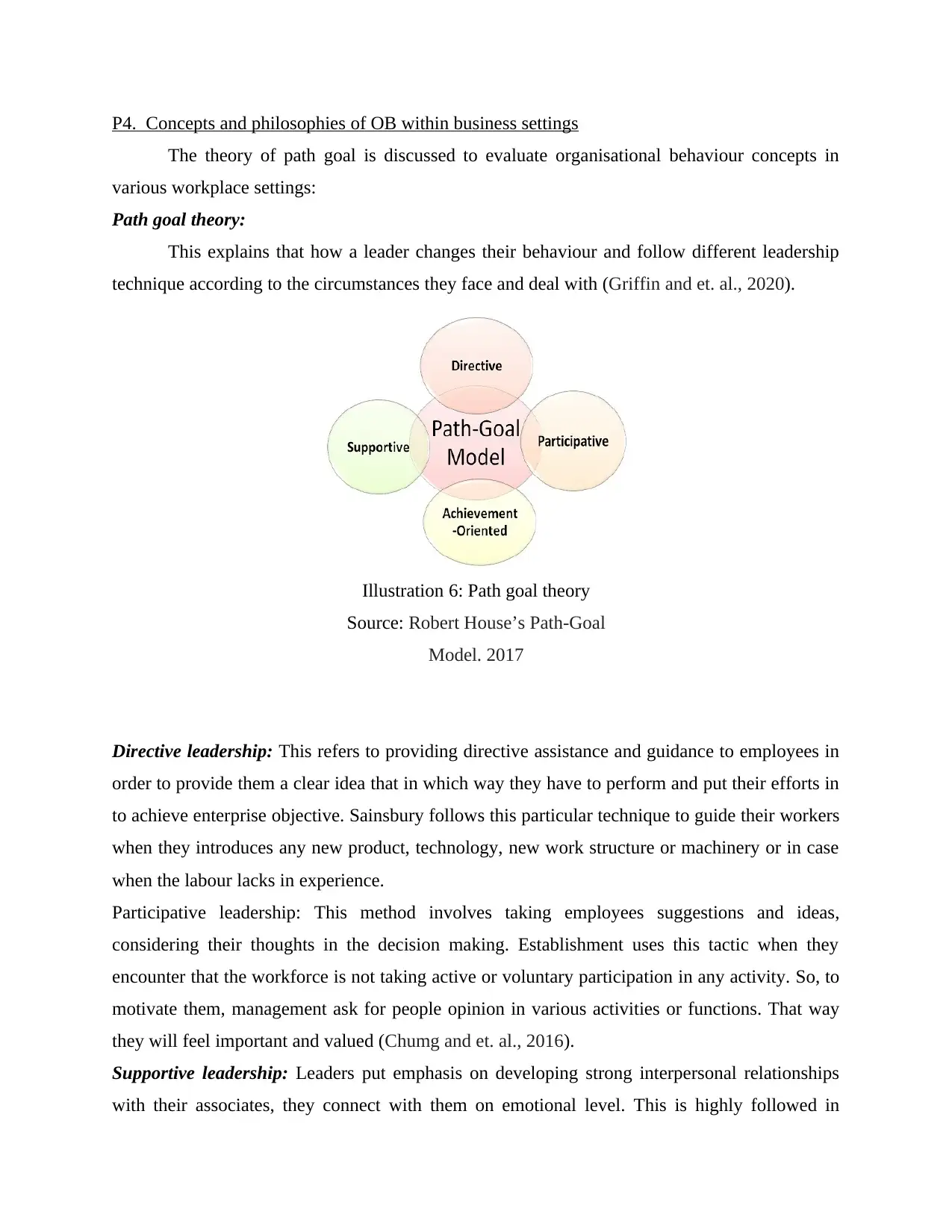
P4. Concepts and philosophies of OB within business settings
The theory of path goal is discussed to evaluate organisational behaviour concepts in
various workplace settings:
Path goal theory:
This explains that how a leader changes their behaviour and follow different leadership
technique according to the circumstances they face and deal with (Griffin and et. al., 2020).
Directive leadership: This refers to providing directive assistance and guidance to employees in
order to provide them a clear idea that in which way they have to perform and put their efforts in
to achieve enterprise objective. Sainsbury follows this particular technique to guide their workers
when they introduces any new product, technology, new work structure or machinery or in case
when the labour lacks in experience.
Participative leadership: This method involves taking employees suggestions and ideas,
considering their thoughts in the decision making. Establishment uses this tactic when they
encounter that the workforce is not taking active or voluntary participation in any activity. So, to
motivate them, management ask for people opinion in various activities or functions. That way
they will feel important and valued (Chumg and et. al., 2016).
Supportive leadership: Leaders put emphasis on developing strong interpersonal relationships
with their associates, they connect with them on emotional level. This is highly followed in
Illustration 6: Path goal theory
Source: Robert House’s Path-Goal
Model. 2017
The theory of path goal is discussed to evaluate organisational behaviour concepts in
various workplace settings:
Path goal theory:
This explains that how a leader changes their behaviour and follow different leadership
technique according to the circumstances they face and deal with (Griffin and et. al., 2020).
Directive leadership: This refers to providing directive assistance and guidance to employees in
order to provide them a clear idea that in which way they have to perform and put their efforts in
to achieve enterprise objective. Sainsbury follows this particular technique to guide their workers
when they introduces any new product, technology, new work structure or machinery or in case
when the labour lacks in experience.
Participative leadership: This method involves taking employees suggestions and ideas,
considering their thoughts in the decision making. Establishment uses this tactic when they
encounter that the workforce is not taking active or voluntary participation in any activity. So, to
motivate them, management ask for people opinion in various activities or functions. That way
they will feel important and valued (Chumg and et. al., 2016).
Supportive leadership: Leaders put emphasis on developing strong interpersonal relationships
with their associates, they connect with them on emotional level. This is highly followed in
Illustration 6: Path goal theory
Source: Robert House’s Path-Goal
Model. 2017
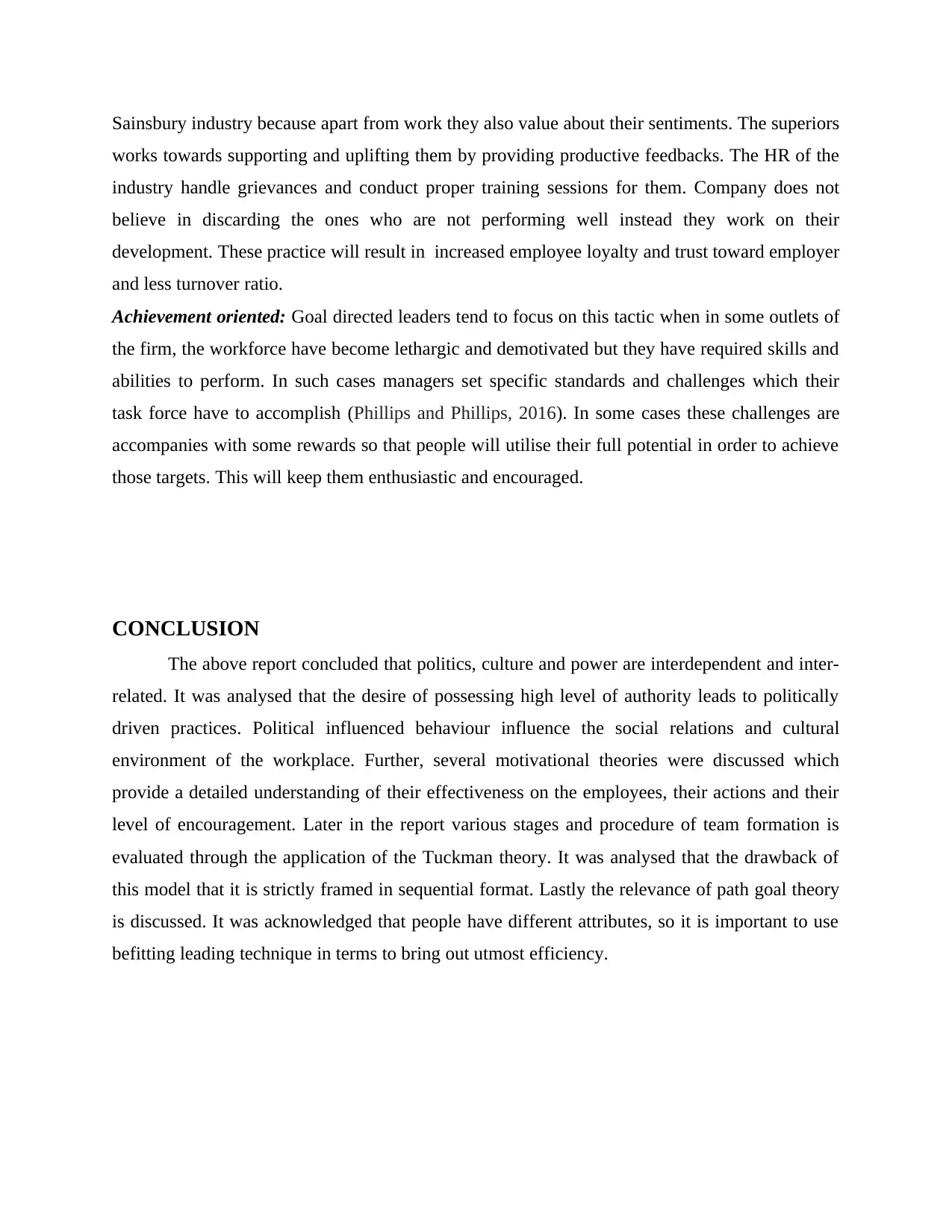
Sainsbury industry because apart from work they also value about their sentiments. The superiors
works towards supporting and uplifting them by providing productive feedbacks. The HR of the
industry handle grievances and conduct proper training sessions for them. Company does not
believe in discarding the ones who are not performing well instead they work on their
development. These practice will result in increased employee loyalty and trust toward employer
and less turnover ratio.
Achievement oriented: Goal directed leaders tend to focus on this tactic when in some outlets of
the firm, the workforce have become lethargic and demotivated but they have required skills and
abilities to perform. In such cases managers set specific standards and challenges which their
task force have to accomplish (Phillips and Phillips, 2016). In some cases these challenges are
accompanies with some rewards so that people will utilise their full potential in order to achieve
those targets. This will keep them enthusiastic and encouraged.
CONCLUSION
The above report concluded that politics, culture and power are interdependent and inter-
related. It was analysed that the desire of possessing high level of authority leads to politically
driven practices. Political influenced behaviour influence the social relations and cultural
environment of the workplace. Further, several motivational theories were discussed which
provide a detailed understanding of their effectiveness on the employees, their actions and their
level of encouragement. Later in the report various stages and procedure of team formation is
evaluated through the application of the Tuckman theory. It was analysed that the drawback of
this model that it is strictly framed in sequential format. Lastly the relevance of path goal theory
is discussed. It was acknowledged that people have different attributes, so it is important to use
befitting leading technique in terms to bring out utmost efficiency.
works towards supporting and uplifting them by providing productive feedbacks. The HR of the
industry handle grievances and conduct proper training sessions for them. Company does not
believe in discarding the ones who are not performing well instead they work on their
development. These practice will result in increased employee loyalty and trust toward employer
and less turnover ratio.
Achievement oriented: Goal directed leaders tend to focus on this tactic when in some outlets of
the firm, the workforce have become lethargic and demotivated but they have required skills and
abilities to perform. In such cases managers set specific standards and challenges which their
task force have to accomplish (Phillips and Phillips, 2016). In some cases these challenges are
accompanies with some rewards so that people will utilise their full potential in order to achieve
those targets. This will keep them enthusiastic and encouraged.
CONCLUSION
The above report concluded that politics, culture and power are interdependent and inter-
related. It was analysed that the desire of possessing high level of authority leads to politically
driven practices. Political influenced behaviour influence the social relations and cultural
environment of the workplace. Further, several motivational theories were discussed which
provide a detailed understanding of their effectiveness on the employees, their actions and their
level of encouragement. Later in the report various stages and procedure of team formation is
evaluated through the application of the Tuckman theory. It was analysed that the drawback of
this model that it is strictly framed in sequential format. Lastly the relevance of path goal theory
is discussed. It was acknowledged that people have different attributes, so it is important to use
befitting leading technique in terms to bring out utmost efficiency.
Paraphrase This Document
Need a fresh take? Get an instant paraphrase of this document with our AI Paraphraser
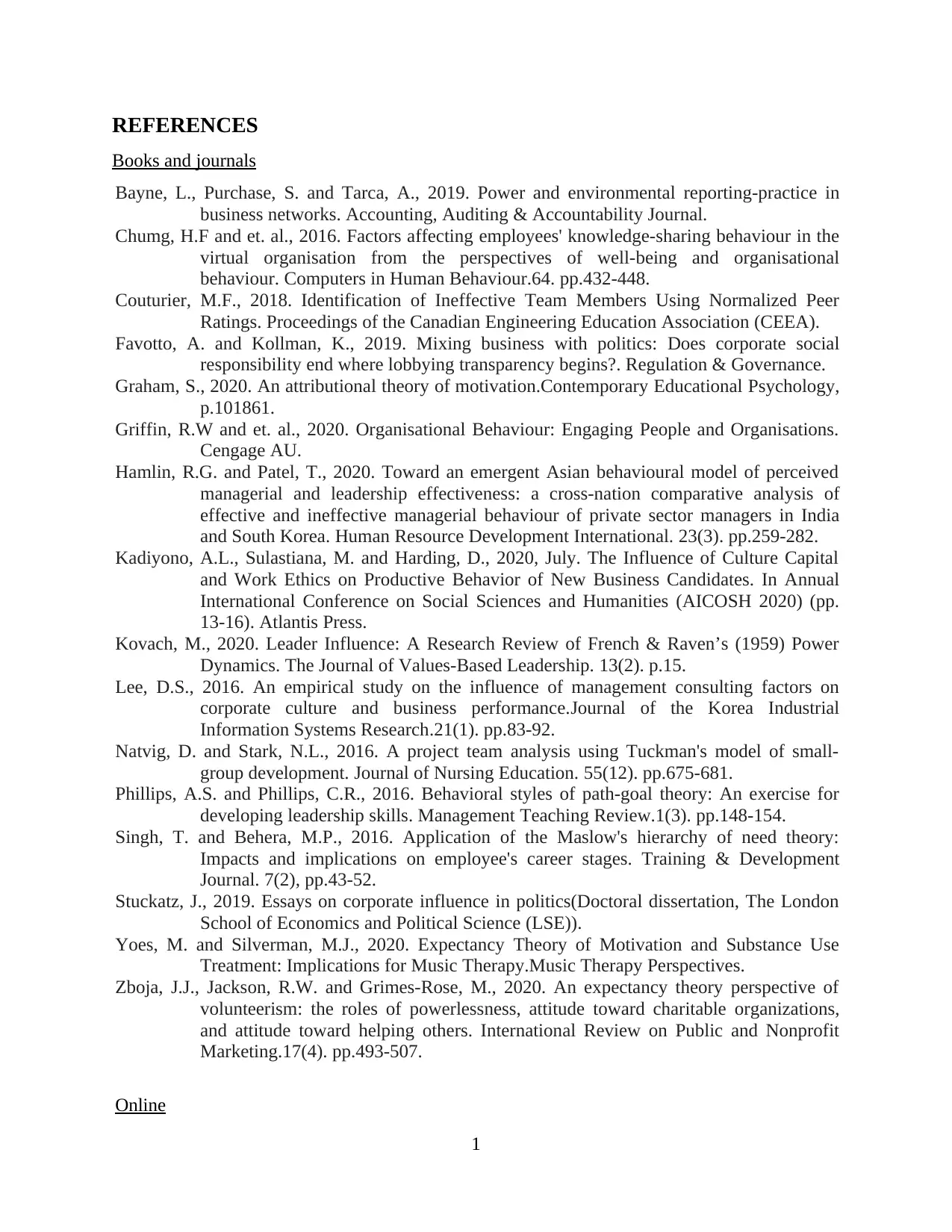
REFERENCES
Books and journals
Bayne, L., Purchase, S. and Tarca, A., 2019. Power and environmental reporting-practice in
business networks. Accounting, Auditing & Accountability Journal.
Chumg, H.F and et. al., 2016. Factors affecting employees' knowledge-sharing behaviour in the
virtual organisation from the perspectives of well-being and organisational
behaviour. Computers in Human Behaviour.64. pp.432-448.
Couturier, M.F., 2018. Identification of Ineffective Team Members Using Normalized Peer
Ratings. Proceedings of the Canadian Engineering Education Association (CEEA).
Favotto, A. and Kollman, K., 2019. Mixing business with politics: Does corporate social
responsibility end where lobbying transparency begins?. Regulation & Governance.
Graham, S., 2020. An attributional theory of motivation.Contemporary Educational Psychology,
p.101861.
Griffin, R.W and et. al., 2020. Organisational Behaviour: Engaging People and Organisations.
Cengage AU.
Hamlin, R.G. and Patel, T., 2020. Toward an emergent Asian behavioural model of perceived
managerial and leadership effectiveness: a cross-nation comparative analysis of
effective and ineffective managerial behaviour of private sector managers in India
and South Korea. Human Resource Development International. 23(3). pp.259-282.
Kadiyono, A.L., Sulastiana, M. and Harding, D., 2020, July. The Influence of Culture Capital
and Work Ethics on Productive Behavior of New Business Candidates. In Annual
International Conference on Social Sciences and Humanities (AICOSH 2020) (pp.
13-16). Atlantis Press.
Kovach, M., 2020. Leader Influence: A Research Review of French & Raven’s (1959) Power
Dynamics. The Journal of Values-Based Leadership. 13(2). p.15.
Lee, D.S., 2016. An empirical study on the influence of management consulting factors on
corporate culture and business performance.Journal of the Korea Industrial
Information Systems Research.21(1). pp.83-92.
Natvig, D. and Stark, N.L., 2016. A project team analysis using Tuckman's model of small-
group development. Journal of Nursing Education. 55(12). pp.675-681.
Phillips, A.S. and Phillips, C.R., 2016. Behavioral styles of path-goal theory: An exercise for
developing leadership skills. Management Teaching Review.1(3). pp.148-154.
Singh, T. and Behera, M.P., 2016. Application of the Maslow's hierarchy of need theory:
Impacts and implications on employee's career stages. Training & Development
Journal. 7(2), pp.43-52.
Stuckatz, J., 2019. Essays on corporate influence in politics(Doctoral dissertation, The London
School of Economics and Political Science (LSE)).
Yoes, M. and Silverman, M.J., 2020. Expectancy Theory of Motivation and Substance Use
Treatment: Implications for Music Therapy.Music Therapy Perspectives.
Zboja, J.J., Jackson, R.W. and Grimes-Rose, M., 2020. An expectancy theory perspective of
volunteerism: the roles of powerlessness, attitude toward charitable organizations,
and attitude toward helping others. International Review on Public and Nonprofit
Marketing.17(4). pp.493-507.
Online
1
Books and journals
Bayne, L., Purchase, S. and Tarca, A., 2019. Power and environmental reporting-practice in
business networks. Accounting, Auditing & Accountability Journal.
Chumg, H.F and et. al., 2016. Factors affecting employees' knowledge-sharing behaviour in the
virtual organisation from the perspectives of well-being and organisational
behaviour. Computers in Human Behaviour.64. pp.432-448.
Couturier, M.F., 2018. Identification of Ineffective Team Members Using Normalized Peer
Ratings. Proceedings of the Canadian Engineering Education Association (CEEA).
Favotto, A. and Kollman, K., 2019. Mixing business with politics: Does corporate social
responsibility end where lobbying transparency begins?. Regulation & Governance.
Graham, S., 2020. An attributional theory of motivation.Contemporary Educational Psychology,
p.101861.
Griffin, R.W and et. al., 2020. Organisational Behaviour: Engaging People and Organisations.
Cengage AU.
Hamlin, R.G. and Patel, T., 2020. Toward an emergent Asian behavioural model of perceived
managerial and leadership effectiveness: a cross-nation comparative analysis of
effective and ineffective managerial behaviour of private sector managers in India
and South Korea. Human Resource Development International. 23(3). pp.259-282.
Kadiyono, A.L., Sulastiana, M. and Harding, D., 2020, July. The Influence of Culture Capital
and Work Ethics on Productive Behavior of New Business Candidates. In Annual
International Conference on Social Sciences and Humanities (AICOSH 2020) (pp.
13-16). Atlantis Press.
Kovach, M., 2020. Leader Influence: A Research Review of French & Raven’s (1959) Power
Dynamics. The Journal of Values-Based Leadership. 13(2). p.15.
Lee, D.S., 2016. An empirical study on the influence of management consulting factors on
corporate culture and business performance.Journal of the Korea Industrial
Information Systems Research.21(1). pp.83-92.
Natvig, D. and Stark, N.L., 2016. A project team analysis using Tuckman's model of small-
group development. Journal of Nursing Education. 55(12). pp.675-681.
Phillips, A.S. and Phillips, C.R., 2016. Behavioral styles of path-goal theory: An exercise for
developing leadership skills. Management Teaching Review.1(3). pp.148-154.
Singh, T. and Behera, M.P., 2016. Application of the Maslow's hierarchy of need theory:
Impacts and implications on employee's career stages. Training & Development
Journal. 7(2), pp.43-52.
Stuckatz, J., 2019. Essays on corporate influence in politics(Doctoral dissertation, The London
School of Economics and Political Science (LSE)).
Yoes, M. and Silverman, M.J., 2020. Expectancy Theory of Motivation and Substance Use
Treatment: Implications for Music Therapy.Music Therapy Perspectives.
Zboja, J.J., Jackson, R.W. and Grimes-Rose, M., 2020. An expectancy theory perspective of
volunteerism: the roles of powerlessness, attitude toward charitable organizations,
and attitude toward helping others. International Review on Public and Nonprofit
Marketing.17(4). pp.493-507.
Online
1
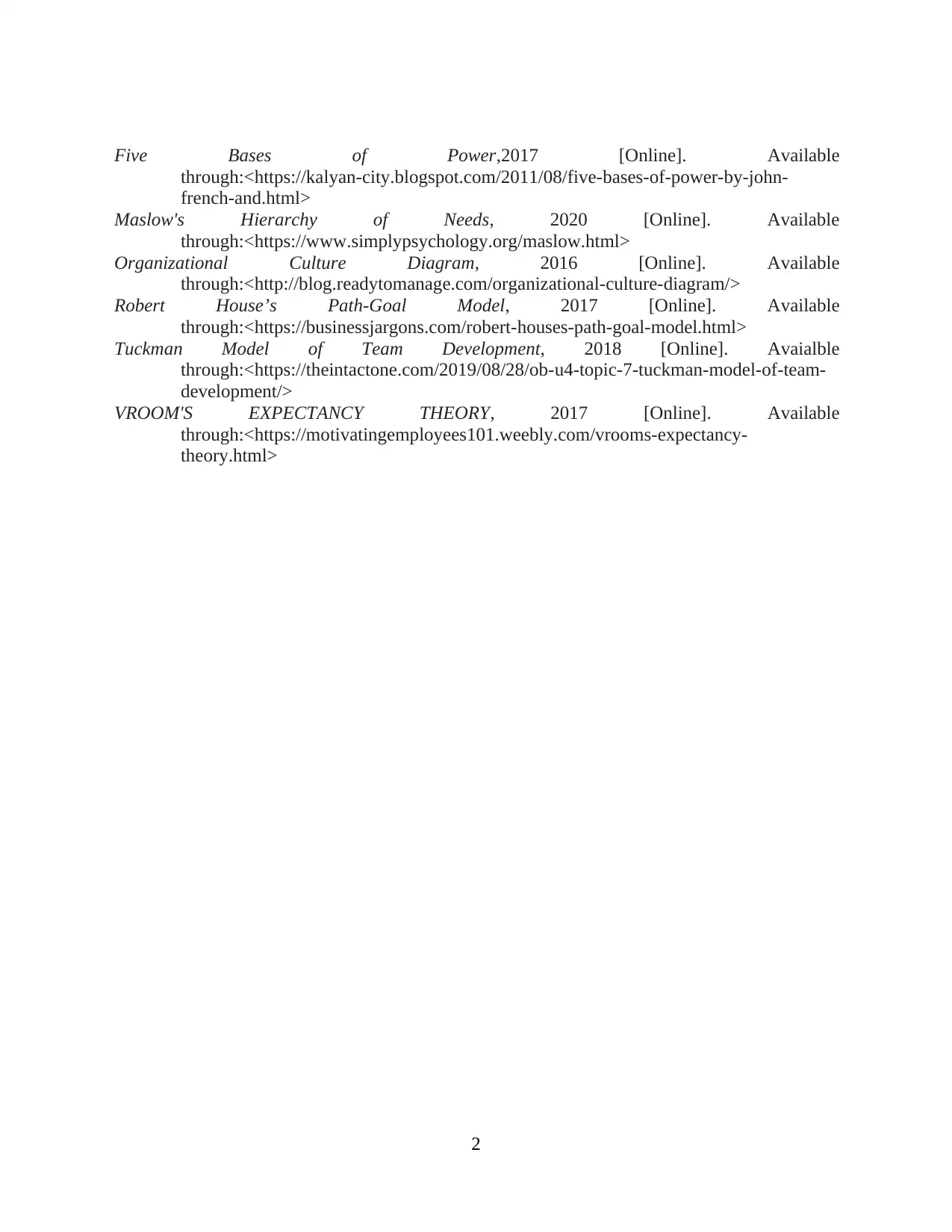
Five Bases of Power,2017 [Online]. Available
through:<https://kalyan-city.blogspot.com/2011/08/five-bases-of-power-by-john-
french-and.html>
Maslow's Hierarchy of Needs, 2020 [Online]. Available
through:<https://www.simplypsychology.org/maslow.html>
Organizational Culture Diagram, 2016 [Online]. Available
through:<http://blog.readytomanage.com/organizational-culture-diagram/>
Robert House’s Path-Goal Model, 2017 [Online]. Available
through:<https://businessjargons.com/robert-houses-path-goal-model.html>
Tuckman Model of Team Development, 2018 [Online]. Avaialble
through:<https://theintactone.com/2019/08/28/ob-u4-topic-7-tuckman-model-of-team-
development/>
VROOM'S EXPECTANCY THEORY, 2017 [Online]. Available
through:<https://motivatingemployees101.weebly.com/vrooms-expectancy-
theory.html>
2
through:<https://kalyan-city.blogspot.com/2011/08/five-bases-of-power-by-john-
french-and.html>
Maslow's Hierarchy of Needs, 2020 [Online]. Available
through:<https://www.simplypsychology.org/maslow.html>
Organizational Culture Diagram, 2016 [Online]. Available
through:<http://blog.readytomanage.com/organizational-culture-diagram/>
Robert House’s Path-Goal Model, 2017 [Online]. Available
through:<https://businessjargons.com/robert-houses-path-goal-model.html>
Tuckman Model of Team Development, 2018 [Online]. Avaialble
through:<https://theintactone.com/2019/08/28/ob-u4-topic-7-tuckman-model-of-team-
development/>
VROOM'S EXPECTANCY THEORY, 2017 [Online]. Available
through:<https://motivatingemployees101.weebly.com/vrooms-expectancy-
theory.html>
2
1 out of 15
Your All-in-One AI-Powered Toolkit for Academic Success.
+13062052269
info@desklib.com
Available 24*7 on WhatsApp / Email
![[object Object]](/_next/static/media/star-bottom.7253800d.svg)
Unlock your academic potential
© 2024 | Zucol Services PVT LTD | All rights reserved.




